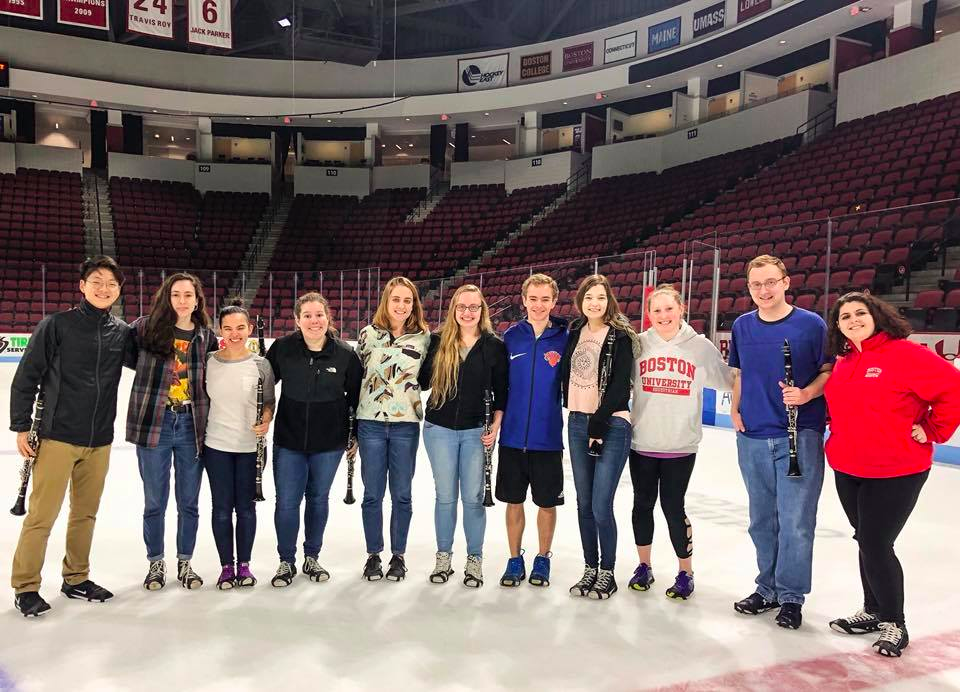In the earlier days, student publications were run by students.
In 2009, Lauren Hockenson founded the independent online magazine, The Quad, to keep students aware of what was happening on campus and to be connected at a huge university that can feel isolating at times.
That same year, The Buzz, a print lifestyle magazine and outlet for industry experience, was born at BU. Soon after, the blog BU Culture Shock, part of the Howard Thurman Center, was started to showcase a variety of people’s perspectives. A few years later, The BU News Service (BUNS), a student-run multimedia news site, grew out of a grad student’s thesis project; the purpose was to create an outlet where any BU student could contribute a news story or showcase their best stories from journalism classes.
Just a few years before, student-run publications were appearing all over campus, and there was no shortage of writers or content.
The latest publications to arrive on campus, however, have a very different origin and purpose. These shiny new media sites – the Tab, Black Sheep BU and Spoon University – operate under an online news network where there is a central site with outlets at many different colleges. Some of the distinctly appealing factors are their successful online platforms, social media engagement and Buzzfeed-y, entertaining stories.
If new media sites were an extension of traditional student-run publications, it wouldn’t be a big deal. However, what’s alarming is that these sites are missing a core component of what journalism is all about – the hard-hitting news that hold our university’s administration accountable and inform the student body of the actions their university is taking.
The focus on highly shareable, quick-hit stories is eroding real investigative journalistic work that has the ability to affect real change on campus.
“I am very concerned about the future of student-run campus publications, especially the independent ones like the Daily Free Press. They are a really important training ground for student journalists,” said Christopher Daly, a journalism professor in COM and formerly at the Associated Press and Washington Post.
He mentioned David Barboza, a New York Times reporter who covered corruption in China, and how Barboza has said that he got his start as an investigative reporter at the Daily Free Press, looking into the doings of former BU president John Silber.
Daly said that he encourages students to express themselves in different mediums; however, at the same time, warned that “we do not want to lose the core competency of finding out stuff that powerful people want to keep hidden.”
The allure of quick-hit stories
Kaya Williams brought the Black Sheep, a satirical news site that started at the University of Illinois, to BU last September. She finds the Black Sheep to be “downright fun,” making up stories and writing everything from Pokemon Go stampedes to a ranking of dorms on campus.
“People want to share, people want to connect to a wider community,” said Spencer Dukoff, a former managing editor at Spoon University – a news site for “foodies.” “When you have that sense of local community within a college chapter that is part of a larger program that features thousands of students that have millions of readers, I think that’s exciting to people.”
In 2015, The Tab, an entertainment news site based in the United Kingdom, launched at 23 colleges in the United States. The Tab’s stories range from lighter news like the BU tuition cost measured in number of drinks to more serious stuff like student reactions to Trump’s immigration ban.
Their stories are widely shared on social media, and they’ve recently expanded into video – in early March, a video on what happens if Massachusetts schools had a group chat blew up with over 210,000 views and close to 1,000 shares.
While The Tab claims that they are “breaking news” on campus – a Quad investigation found they have reported on rumors and half truths – the “steady increase [of tuition] year by year” is incorrect based on the numbers, and there is no source mentioned when saying that “BU is the second most expensive school in the nation.” The investigation also found several examples of issues with grammar and spelling – like the numerous wrong usages of affect/effect.
Understandably, all publications – even the New York Times – will occasionally slip spelling and grammatical errors; however, the point is that these new media sites are lacking the core tenets of journalism. They are more concerned with getting the word out first before getting them right, which reflects the larger issue of “fake news” on a national scale.
This might be fine if the other, arguably more reputable publications on campus, remained more popular, but the new media sites have gained huge traction – the numbers seem to show that it took the FreeP longer to amass readers than the new sites. The independent newspaper The Daily Free Press, established in 1970, averages 200,000 page views per month. Only two years old, The Tab already attracts half as many.
This surge in engagement is likely due to the sites relying heavily on social media, as well as the outside support and resources of bigger organizations.
The Tab has featured stories on the New York Times, the Guardian, Buzzfeed and BBC. Spoon University writers have the chance to connect with the professional editorial team at their headquarters in New York. Tech support is available for a number of these sites – putting student-run publications on campus at a major disadvantage.
But keep in mind, clicking on an article, which accounts for a page view, does not necessarily indicate the story was read. In other words, the most highly shared stories aren’t necessarily the best stories. This is the crux of the issue for student-run publications: Because student-run publications aren’t as flashy as their newer counterparts, their strong writing and editing skills have trouble translating to attention in the overwhelming frenzy of news sharing online.
Part of it has to do with social media strategy, but the bigger deal is that thoroughly reported stories about campus news aren’t being read and possibly aren’t even being written in favor of Buzzfeed-y, lighter pieces that will be highly shared.
The pressure of the situation falls hard on traditional publications to either adapt or to be left behind.
Endure, adapt and flourish
BUNS, which focuses on more Boston-local than on-campus news, provides a platform where students can practice and improve their reporting skills. In addition to maintaining high journalistic standards, with the support of faculty advisors, they’ve been experimenting with new digital tools like Facebook Live and Periscope and live-tweeting.
Since 2014, The FreeP has also made major changes to the internal organization.
“We want to make sure our newspaper and website are interesting to readers. We will continuing to being in conversation with them,” said Felicia Gans, a board chairman at the FreeP.
Print and web are now seen as two different products, and FreeP treats their “print edition as an opportunity each week to explain things in print that we can’t do online,” according to Gans.
They have about four or five layout designers, several of them with coding experience, helping out with the publication and creating large-scale web products every year. FreeP is also focused on incorporating FB Live.
Callie Ahlgrim, editor-in-chief of The Buzz, recognizes the importance of a publication constantly evolving. “If you want to be relevant, you need to be present online. You need to have name and brand recognition; this includes social media and multimedia formats,” she said. “We revamped our website last year, giving it a more readable and polished format. We’ve also expanded our team to include a Web Director and online contributors who specialize in coding and computer science.”
One key advantage that student-run publications have over these new media sites backed by big organizations is the student’s ability to express and create – and this is what can save the student-run publication.
Ahlgrim, who was appointed editor-in-chief in November, has already been able to implement a new Opinions section for The Buzz, which she didn’t think would be possible if she were writing for a larger organization.
“I think that, while contributing to a more ‘established’ publication may seem appealing to students at first, ultimately that’s all you are—a contributor. You don’t call the shots. You don’t get to foster a connection with your editors and work together to see improvements,” Ahlgrim said. “A magazine created for students and by students is a rare and beautiful thing. There’s honestly nothing like seeing your own vision come to life and being able to say that you and your peers made that happen.”
Who to turn to when in need of money?
While the Tab and Spoon University are branches of a larger network and therefore have support, other campus publications have struggled to stay afloat.
After slashing their print copies to once a week and almost going bankrupt in 2014, The FreeP learned the hard way that they needed to evolve into a digital-first publication.
“We used to have a mindset of being stuck in their ways and liking the product they have and not feeling the need to change it,” Gans said. “I think we realize now readers want to see a constantly changing product, and that’s the best thing we can offer.”
However, despite having strong initiatives and impressive fundraising efforts, the FreeP still receives support and resources.
“[W]e see ourselves as a vital piece of the university, and we have been lucky that many university administrators have felt that way too,” Gans said. “Dean Elmore, for example, has played a significant role in giving us a space on campus and ensuring that we feel included in student activity events.”
To stay sustainable, many of the student-run publications are turning to the university for help: along with the FreeP, BUNS have BU faculty members Michelle Johnson and Anne Donohue acting as advisors, and The Buzz –which continues to publish a print edition every semester –received funding from the Student Activities Office this past semester. The Quad, while it utilizes the CGSA in the GSU for a meeting space, receives no outside funding.
The question remains, though: do these relationships strain a publication’s ability to hold their university accountable?




